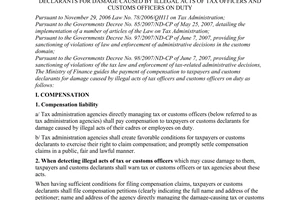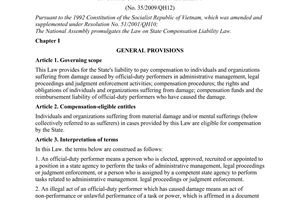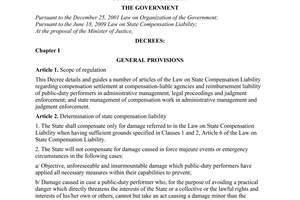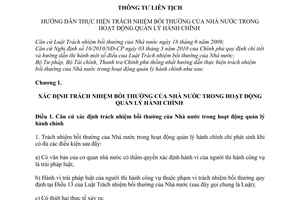Nội dung toàn văn Jonit Circular No. 19/2010/TTLT-BTP-BTC-TTCP guiding the discharge of the state
|
THE
MINISTRY OF JUSTICE, THE MINISTRY OF FINANCE AND THE GOVERNMENT INSPECTORATE |
SOCIALIST
REPUBLIC OF VIET NAM |
|
Hanoi, November 26, 2010 |
JOINT CIRCULAR
GUIDING THE DISCHARGE OF THE STATE COMPENSATION LIABILITY IN ADMINISTRATIVE MANAGEMENT ACTIVITIES
Pursuant to the June 18, 2009
Law on State Compensation Liability;
Pursuant to the Governments Decree No. 16/2010/ND-CP of March 3, 2010,
detailing and guiding a number of articles of the Law on State Compensation
Liability;
The Ministry of Justice, the Ministry of Finance and the Government
Inspectorate uniformly guide the discharge of the state compensation liability
in administrative management activities as follows:
Chapter I
DETERMINATION OF THE STATE COMPENSATION LIABILITY IN ADMINISTRATIVE MANAGEMENT ACTIVITIES
Article 1. Grounds for determination of the state compensation liability in administrative management activities
1. The state compensation liability in administrative management activities arises only when all the following conditions exist:
a/ There is a document issued by a competent state agency affirming that an act of a public-duty performer is illegal;
b/ The illegal act of a public-duty performer falls within the scope of compensation liability defined in Article 13 of the Law on State Compensation Liability (below referred to as the Law);
c/ An actual damage is caused;
d/ There is a cause-effect relationship between an actual damage and an illegal act of a public-duty performer.
2. The State will not compensate for damage caused by sufferers who are totally at fault. In case the public-duty performer and sufferer are both at fault, the State shall compensate for part of damage caused by the public-duty performer's fault.
Article 2. Documents of competent state agencies affirming illegal acts of public-duty performers
1. Complaint settlement decisions of competent persons which have become legally effective under law.
2. Decisions of competent agencies or persons on handling of denunciations under law.
3. Legally effective court judgments or decisions on handling of administrative cases.
Article 3. Determination of the scope of compensation liability
The scope of compensation liability in some specific cases shall be determined as follows:
1. Application of measures mentioned in Clauses 2, 3 and 4 Article 13 of the Law means that public-duty performers take illegal acts causing damage when issuing decisions on handling of administrative violations or taking these measures.
2. Imposition of taxes, charges and fees mentioned in Clause 6, Article 13 of the Law means that public-duty performers take illegal acts causing damage when:
a/ Identifying taxpayers and tax-liable objects;
b/ Determining tax, charge or fee bases;
c/ Giving tax, charge or fee exemption, reduction, refund, rescheduling or remission.
3. Application of customs procedures mentioned in Clause 7, Article 13 of the Law means that public-duty performers take illegal acts causing damage when:
a/ Receiving and registering customs dossiers;
b/ Examining dossiers; conducting physical inspection of goods and vehicles;
c/ Permitting customs clearance of goods and vehicles.
4. Papers of permit validity mentioned in Clauses 5 and 11, Article 13 of the Law include written certification, consent, approval; practice certificate; certificate and other kinds of paper granted by competent state agencies to organizations and individuals for the latter to exercise their rights and perform their obligations under law.
Article 4. Actual damage
Actual damage means a real damage caused to a sufferer by an illegal act of a public-duty performer. Actual damage includes material damage and damage due to mental suffering.
1. Material damage under the state compensation liability in administrative management includes damage due to asset infringement specified in Article 45 of the Law; damage due to loss of or decrease in actual incomes specified in Article 46 of the Law; material loss due to the death of the sufferer specified in Article 48 of the Law; and material loss due to harm to health specified in Article 49 of the Law.
2. Damage due to mental suffering under the state compensation liability in administrative management includes damage due to mental suffering during the administrative custody or confinement to a reformatory, re-educational or medical establishment specified in Clause 1, Article 47 of the Law; damage due to mental suffering in case of death of the sufferer specified in Clause 3, Article 47 of the Law; damage due to mental suffering in case of harm to health specified in Clause 4, Article 47 of the Law.
Chapter II
DETERMINATION OF COMPENSABLE DAMAGE
Article 5. Damage due to asset infringement
1. Damage due to asset infringement shall be determined under Article 45 of the Law. In case infringed assets are land use rights, houses, construction works and land-attached assets, compensable damage shall be determined under Article 45 of the Law and relevant laws.
2. Period of calculation of interests on money amounts specified in Clause 4, Article 45 of the Law shall be counted from the date on which these amounts are remitted into the state budget; confiscated; kept for judgment enforcement; or deposited as security at competent agencies to the date of issuance of compensation payment decisions by compensation-liable agencies or judgments or decisions by courts.
Article 6. Damage due to loss of or decrease in actual incomes
1. Damage due to loss of or decrease in actual incomes of organizations
Damage due to loss of or decrease in actual incomes of organizations mentioned in Article 46 of the Law shall be determined on the basis of the average income of 2 consecutive years prior to the time the damage is caused. Incomes of organizations shall be determined according to these organizations' lawful financial statements. Organizations without financial statements may prove the loss of or decrease in their actual incomes with other lawful documents or proofs under relevant laws.
For an organization established for less than 2 years by the date the damage is caused, its actual incomes shall be determined based on the average income earned during its actual operation period.
2. Damage due to loss of or decrease in actual incomes of individuals
a/ Actual incomes of individuals mentioned in Article 46 of the Law shall be determined as follows:
In case a sufferer earns stable incomes from state-payroll salary or wage under a labor contract prior to the time when the damage is caused, his/ her actual incomes shall be determined based on his/her salary or wage of the month preceding the month when the damage is caused.
In case a sufferer is employed but earns unstable monthly incomes prior to the lime when the damage is caused, his/her actual incomes shall be determined based on the average income of 3 consecutive months preceding the month when the damage is caused.
In case a sufferer is a fanner, fisherman, salt maker, forester, employee, small merchant, craftsman or doing another occupation and earns seasonal or unstable incomes, his/her actual incomes shall be determined based on the average income of local laborers doing the same occupation. If such average income is unidentifiable, his/her actual incomes shall be determined based on the State-prescribed minimum salary level applicable to civil servants of state administrative agencies at the time of compensation payment.
b/ Sufferers (including also deceased persons) are entitled to compensations for their actual incomes lost or decreased during the period of their temporary administrative custody, confinement to a reformatory, re-educational or medical establishment and during the period of their medical treatment for health rehabilitation. During such period, if sufferers have their salaries or wages fully paid by their agencies or employers under the labor and social insurance laws, they will not be entitled to compensations. If sufferers have only part of their salaries or wages paid by their agencies or employers, the remaining part of their salaries or wages shall be determined as decreased actual incomes and they will be entitled to compensations for such decreased income amounts.
Example 1:
Mr. A is a self-employed newspaper seller. Due to being unlawfully confined to a medical establishment, he earns no income during the period of confinement. His incomes prior to his confinement are unstable but his incomes in 3 months prior to the time the damage is caused are determined to be VND 1,200,000; 1,000,000 and 1,100,000. His actual incomes shall be determined to be the average income of the 3 months prior the time the damage is caused, VND 1,100,000. In this case, Mr. A's actual incomes are lost and he will be entitled to a compensation of VND 1,100,000 for each month of his confinement to the medical establishment.
Example 2:
Mrs. B works for a law firm. Her monthly income is stable at an average of VND 3,000,000 before her health is harmed. Due to her declining health, she needs medical treatment and during the period of medical treatment her company pays her 40% of her monthly wage or VND 1,200,000. In this case, Mrs. B's actual incomes are reduced by VND 1,800.000 a month, so she will be entitled to a compensation equal to her decreased actual incomes during the period of medical treatment.
Example 3:
Mr. C is a civil servant having a stable monthly income of VND 1,700,000. Due to a harm to his health, he needs medical treatment and during the period of medical treatment his agency still pays him his income in full. In this case, Mr. C's actual incomes are not reduced so he will not be entitled to any compensation.
Article 7. Damage due to mental suffering
1. Damage due to mental suffering during temporary administrative custody or confinement to a reformatory or re-educational or medical establishment as specified in Clause 1, Article 47 of the Law shall be determined as follows:
a/ One day's minimum salary shall be determined by the State-prescribed minimum salary level applicable to civil servants working in state administrative agencies at the time of compensation payment divided by 22 (the average number of working days a month).
Example: At the time of issuance of this Joint Circular, the State -pre scribed common minimum salary is VND 730,000. As a result, one day's minimum salary is VND 730,000 : 22 - VND 33.182.
b/ The number of days of temporary administrative custody or confinement to a reformatory or re-educational or medical establishment shall be determined according to the actual number of days during which a person eligible for compensation is held in temporary administrative custody or confined to a reformatory or re-educational or medical establishment.
Example: Mr. A is confined to a medical establishment from December 1, 2010. and discharged from that establishment on March 1. 2011. On March 20, 2011, a competent agency determines that lie is not subject to the measure of confinement to a medical establishment. In this case, Mr. A's compensable damage due to mental suffering shall be determined as follows:
The actual number of days during which he is confined to a medical establishment is 31 days of December 2010 plus 31 days of January 2011 plus 28 days of February 2011 = 90 days.
The number of days salaried at the minimum salary level for compensation calculation is: 90 days x 2 = 180 days.
In this example, the money amount to be paid by the State as a compensation for Mr. A is 180 days x VND 33,182 = VND 5,972,760.
2. Damage due to mental suffering in case of death of the sufferer mentioned in Clause 3, Article 47 of the Law shall be determined as follows:
a/ If the sufferer dies during his/her temporary administrative custody or confinement to a reformatory or re-educational or medical establishment not due to his/her fault or a force majeure or emergency circumstance, his/her relatives will be entitled to a compensation for damage due to mental suffering equal to 360 months' salary calculated at the state-prescribed common minimum salary in effect at the time of compensation payment;
b/ If a person held in temporary administrative custody or confined to a reformatory or re-educational or medical establishment dies during this period due to his/her fault or a force majeure or emergency circumstance, his/her relatives will not be entitled to a compensation for damage due to mental suffering under Clause 3, Article 47 of the Law;
c/ Compensation for damage due to mental suffering is a common compensation amount for relatives of a sufferer (his/her spouse, blood parents, adoptive parents, blood children, adopted children and caretaker). Persons entitled to compensation in this case must be alive at the time of death of the sufferer.
Article 8. Material loss due to death of sufferers
1. Reasonable expenses for medical treatment and health recovery of and care for a sufferer before his/her death mentioned in Clause 1, Article 48 of the Law are necessary actual expenses suitable to the nature and degree of the damage and consistent with average prices in each locality at the time of payment, including rental for vehicles for carrying the sufferer to a medical establishment for intensive care; expenses for medicines and purchase of medical instruments; expenses for screening. X-ray, CT scanning, ultrasound imaging, tests, surgery and blood transfusion as prescribed by doctors; hospital fee; protein infusion and expenses for health recovery for the sufferer as prescribed by doctors; other necessary actual expenses (if any) paid before the death of the sufferer.
2. Expenses for funeral of deceased sufferers specified in Clause 2, Article 48 of the Law shall be determined based on the funeral allowance specified by the law on social insurance.
3. Compensations shall be paid only for alimonies for persons to whom sufferers are currently obliged to pay specified in Clause 3. Article 48 of the Law, provided that sufferers pay the alimonies before they are held in temporary administrative custody or confined to a re-educational or medical establishment and they die during the period of administrative custody or confinement. Persons to whom sufferers are currently providing alimonies will be entitled to compensations for such alimonies.
Article 9. Material loss due to harm to health
1. Reasonable expenses for medical treatment, health fostering and recovery and functional rehabilitation mentioned in Clause 1, Article 49 of the Law include expenses guided in Clause 1, Article 8 of this Circular and expenses for fitting of artificial limbs and false eyes, purchase of wheelchairs and crutches and aesthetic surgery and other expenses for support or replacement of part of a lost or deficient body function (if any) of the sufferer.
If a state agency has paid all these expenses, the sufferer is not entitled to any compensation. If a state agency has paid part of these expenses, the sufferer is entitled to compensation for the remaining expenses.
2. Compensation for reasonable expenses and lost actual incomes of the caretaker of the sufferer under Clause 3. Article 49 of the Law.
a/ The sufferer may be entitled to compensation for reasonable expenses and lost actual incomes of his/her caretaker if the care is necessary or at the request of a medical establishment;
b/ Reasonable expenses for the caretaker of the sufferer during the period of treatment include travel fares and accommodations charges (if any) at the average rate in the locality in which these expenses are paid;
c/ Lost actual incomes of the caretaker of the sufferer during the period of treatment shall be determined under Article 46 of the Law and Clause 2. Article 6 of this Circular.
3. A -sufferer who has lost his/her working capacity and needs a constant caretaker means a person who is no longer able to conduct production, business or service activities. Reasonable expenses for a constant caretaker of a sufferer who has lost working capacity mentioned in Clause 4, Article 49 of the Law shall be calculated based on the average remuneration payable to caretakers of persons with disabilities in the locality in which the sufferer resides.
Chapter III
PROCEDURES FOR PAYMENT OF COMPENSATIONS
Article 10. Confirmation of illegal acts of public-duty performers
1. When an organization or individual complains that it/he/she suffers damage caused by an administrative decision or act of a public-duty performer and claims state compensation, it/he/she shall carry out procedures for lodging a complaint under the law on complaints to request a competent person to confirm the public-duty performer's act illegal.
2. Persons competent to settle complaints shall settle complaints strictly according to procedures specified by law. In a complaint settlement decision, the public-duty performer's act must be confirmed to be legal or illegal.
Article 11. Dossiers of compensation claim
A dossier of compensation claim comprises:
a/ A claim for compensation, made according to form No. 0la, 01b or 01c provided in this
Circular (not printed herein);
b/ A copy of a competent state agency's document confirming the public-duty performer's act illegal;
c/ Documents and proofs relevant to the compensation claim.
Article 12. Acceptance of compensation claims
1. Within 2 years after obtaining a competent agency's document confirming a public-duty performer's act illegal, a claimant may send a dossier of compensation claim to the compensation-liable agency by either of the following modes:
a/ Filing the dossier in person;
b/ Sending the dossier by post.
2. Upon receiving a dossier of compensation claim, a compensation-liable agency shall examine the validity of the claim and enclosed documents and papers. In case the dossier is incomplete, it shall guide the claimant to supplement the dossier.
For a competent state agency's document confirming a public-duty performer's illegal act which cannot be provided by the claimant, the compensation-liable agency shall collect it.
3. Within 5 working days after receiving the claim and valid documents, if it determines that the claim falls within its handling responsibility, an agency that has received the dossier shall accept the case and notify such in writing to the claimant. In case the claim-receiving agency sees that the case falls beyond its handling responsibility, it shall return the dossier and guide the claimant in sending the claim to a state management agency in charge of compensation payment for identifying the compensation-liable agency under Chapter TV of the Government's Decree No. 16/2010/ND-CP of March 3, 2010, detailing and guiding a number of articles of the Law on State Compensation Liability (below referred to as Decree No. 16/2010/ND-CP).
Article 13. Compensation settlement
Immediately after accepting a compensation claim, the head of the compensation-liable agency shall decide to appoint a representative to settle the compensation (below referred to as the representative) under Article 7 of Decree No. 16/2010/ND-CP.
Article 14. Damage verification
Within 5 working days after accepting a compensation claim, a representative shall organize the damage verification. The damage verification shall be conducted on the basis of documents and proofs provided by the compensation claimant. In case of necessity as specified in Clause 2 or 3. Article 18 of the Law, the compensation-liable agency may request a competent agency or organization to evaluate assets or assess asset damage or health damage or to consult concerned agencies on the settlement of compensation.
The lime limit for damage verification is 20 days after the date of acceptance of a compensation claim. For a case involving many complicated circumstances or requiring the verification to be conducted in many places, the verification time limit may be prolonged but must not exceed 40 days.
Article 15. Negotiations on compensation
Within 3 working days after finishing the damage verification, a representative shall negotiate with the sufferer.
The negotiation time limit is 30 days after the end of damage verification. For a case involving many complicated circumstances, the negotiation time limit may be prolonged but must not exceed 45 days.
Participants in, place for and contents of records of negotiations comply with Clauses 2, 3 and 4. Article 19 of the Law. Negotiation records shall be made according to form No. 02 attached to this Circular (not printed herein).
Article 16. Issuance of compensation settlement decisions
Upon completion of negotiations, a representative shall complete a draft compensation settlement decision for reporting to the head of the compensation-liable agency. Based on results of damage verification. negotiations with the sufferer and opinions of concerned agencies (if any), the head of the compensation-liable agency shall consider and sign a compensation settlement decision. Compensation settlement decisions shall be made according to form No. 03 attached to this Circular (not printed herein).
Article 17. Handover of compensation settlement decisions
Representatives shall hand over compensation settlement decisions according to procedures specified in Article 10 of Decree No. 16/2010/ND-CP.
Article 18. Institution of lawsuits to request courts to settle compensation
A sufferer may institute a lawsuit to request a court to settle compensation in the following cases:
1. He/she/it disagrees with a compensation settlement decision specified in Clause 1, Article 22 of the Law.
2. Upon the expiration of the time limit for issuance of a compensation settlement decision. the compensation-settling agency fails to issue a compensation settlement decision under Clause 1, Article 22 of the Law.
The date of expiration of the time limit for issuance of a compensation settlement decision under Article 22 of the Law is the 11* day after the representative of the compensation-settling agency and the sufferer jointly sign a negotiation minutes.
Article 19. Compensation claims in the course of instituting administrative cases
1. If, in the course of instituting an administrative case, the instituting party complains that a public-duty performer's illegal act has caused damage, he/she/it may request a court competent to handle administrative cases to settle compensation under Articles 24 and 25 of the Law.
2. In case a compensation-liable agency fails to voluntarily execute a legally effective court judgment or decision, the sufferer may file a petition to request a civil judgment enforcement agency to execute such judgment or decision under the law on civil judgment enforcement.
Article 20. Payment of compensations
Based on their effective compensation settlement decisions or legally effective court judgments or decisions, compensation-liable agencies shall pay compensations to sufferers under Chapter VI of the Law.
Chapter IV
IMPLEMENTATION PROVISIONS
Article 21. Effect
1. This Circular takes effect 45 days from the date of its signing.
2. To annul the Ministry of Finance's Circular No. 49/2008/TT-BTC of June 12, 2008, guiding the payment of compensations for damage caused to taxpayers and customs declarants by illegal acts of tax and customs officers while performing public duties.
Article 22. Organization of implementation
Any difficulties or problems arising in the course of implementation should be reported to the Ministry of Justice for the latter to coordinate with the Ministry of Finance and the Government Inspectorate in studying and settling them.-
|
FOR
THE MINISTER OF FINANCE |
FOR
THE MINISTER OF JUSTICE |
FOR
THE INSPECTOR GENERAL
DEPUTY INSPECTOR GENERAL
Tran Duc Luong



